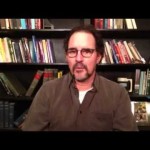We run our website the way we wished the whole internet worked: we provide high quality original content with no ads. We are funded solely by your direct support. Please consider supporting this project.

So Much Evil. Why?
In light of the profound evil being experienced by the people of Paris and countless other locations around the world, we thought we would raise again the question that many ask when things like this occur: Why? Of course, Greg has spent much of his writing and speaking energy addressing this. Here is a basic, introductory summary to the question:
______________________________
The way in which classical-philosophical Christian theists have approached the problem of evil has generally been to frame evil as a problem of God’s providence and thus of God’s character. Assuming (rightly) that God is perfectly loving and good, and assuming (wrongly) that divine omnipotence entails meticulous control, the problem of evil has been formulated within this tradition as a problem of locating a loving and good purpose behind evil events.
This represents an impossible task, and hence the problem of evil becomes simply unsolvable within this framework.
By contrast the warfare worldview is predicated on the assumption that divine goodness does not completely control or in any sense will evil; rather, good and evil are at war with one another. This assumption obviously entails that God is not now exercising exhaustive, meticulous control over the world. In this worldview God must work with, and battle against, other created beings. While none of these beings can ever match God’s own power, each has some degree of genuine influence within the cosmos.
In other words, a warfare worldview is inherently pluralistic. There is no single, all-determinative divine will that coercively steers all things, and hence there is here no supposition that evil agents and events have a secret divine motive behind them. Hence too, one need not agonize over what ultimately good, transcendent divine purpose might be served by any particular event.
If this world is indeed caught up in the middle of a real war between good and evil forces, evil is expected—including evil that serves no higher end. For in any state of war, gratuitous evil is normative. Only when it is assumed that the world is meticulously controlled by an all-loving God does each particular evil even need a higher, all-loving explanation. For only then is evil not expected, hence only then is it intellectually problematic at a concrete level.
In other words, only when we reject the view that the cosmos is something like a society of free beings, most of whom are invisible, and all of whom have some small degree of influence on the whole—in short, only when we reject the warfare worldview in favor of a monistic one in which one sovereign will governs all—are we saddled with an understanding of God and his relationship with the world in which evil becomes impenetrably mysterious on a concrete level.
—Adapted from God at War, pages 20-21
Image via The Daily Times
Category: General
Tags: Evil, Free Will, Open Theism, Warfare Worldview
Related Reading

Analogies For Understanding Prayer
God is all-powerful, which means he owns all the “say-so” there is. But when he decided to populate the creation with free agents, he gave each human various units of “say-so.” [Click here for yesterday’s post on “say-so.”] We each have a certain amount of power to affect what comes to pass by our choices.…

What is the significance of Genesis 2:19 ?
“So out of the ground the Lord God formed every animal of the field and every bird of the air, and brought them to the man to see what he would call them; and whatever the man called every living creature, that was the name.” God wanted Adam to have authority over the animal kingdom…

Why You Have Free Will
God’s decision to create a cosmos that was capable of love and that was, therefore, populated with free agents (see previous post) was also a decision to create and govern a world he could not unilaterally control. These are two aspects of the same decision. What it means for God to give agents some degree…

Free Will: What is a free agent?
What does it really mean to be a free agent? In this reflection, Greg offers some thoughts on free agents and how it can be that they are not exhaustively determined.

How do you respond to Genesis 3:15?
The Lord promises that he will “put enmity between you [the serpent] and the woman, and between your offspring and hers; he will strike your head, and you will strike his heel.” This is commonly considered the first messianic prophecy of the Bible. What a glorious and gracious picture of God we are given here!…

What’s Wrong With The World?
Hartwig HKD via Compfight The reports coming out of Fort Hood this morning once again highlight that our world is messed up. And it often feels like we are rearranging the deck chairs on the Titanic as we try to find answers to address the problems we face. Here are some reflections by Greg on…
